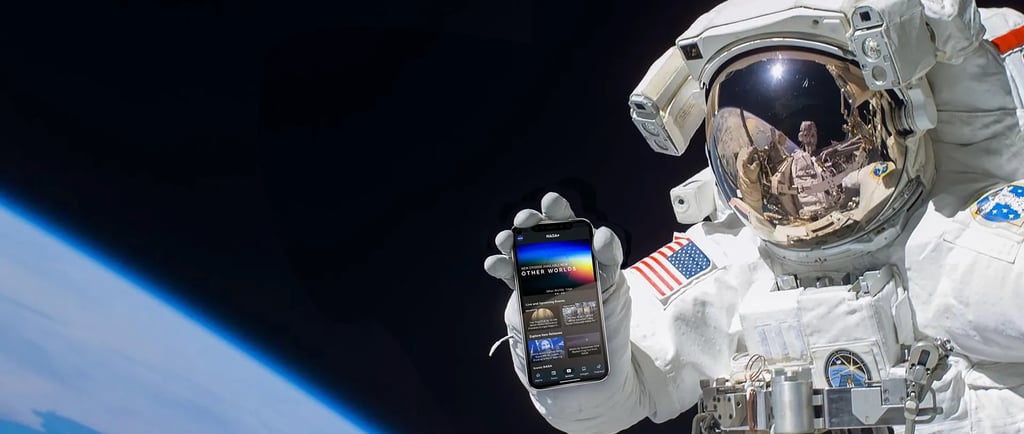Why Do Astronauts Need More Calories in Space? Understanding the Science Behind It
Discover why astronauts need more calories in space due to microgravity, increased metabolism, and physical stress. Learn about space nutrition, astronaut diet, and calorie requirements for space missions.
SCIENCE AND TECHNOLOGY
12/10/20243 min read
Space exploration is an incredible achievement, and astronauts are our brave pioneers in this uncharted territory. But have you ever wondered why astronauts need more calories in space compared to those on Earth? The answer lies in the unique environment of space and how it affects the human body. In this blog post, we'll explore the reasons astronauts require a higher calorie intake in space and the factors that contribute to this increased energy demand.
1. Microgravity and Muscle Atrophy
One of the most significant changes astronauts face in space is the shift to a microgravity environment. In the absence of gravity, muscles and bones don't have to work as hard to support the body. On Earth, gravity constantly pulls down on us, causing our muscles to engage in daily activities like standing, walking, and lifting. In space, however, astronauts float, and their muscles do not have to exert the same level of effort.
To counteract the effects of muscle atrophy (the weakening of muscles), astronauts need to engage in daily exercise routines, which require energy. These exercises help maintain muscle strength and bone density. The additional physical activity, combined with the body’s natural response to muscle loss in space, results in an increased calorie requirement.
2. Increased Metabolism in Space
Living in space also affects the metabolic rate of astronauts. In microgravity, the body's processes such as digestion, circulation, and thermoregulation (temperature control) undergo changes. The lack of gravity alters how the body absorbs and processes food, potentially increasing energy consumption.
Astronauts' bodies often work harder to maintain core temperature regulation due to the environmental extremes in space. They are exposed to both extremely hot and cold temperatures, and this fluctuation demands extra energy to keep the body at a stable, comfortable temperature. This, in turn, increases their calorie requirements.
3. Physical and Psychological Stress
Space missions come with a range of physical and psychological stresses that astronauts have to manage. From the intense launch and re-entry processes to the psychological impact of isolation and confinement, astronauts are constantly under pressure. These stresses can lead to an increased energy expenditure as the body works harder to cope with the demanding conditions.
The stress of being in space can also impact sleep patterns, potentially leading to disturbed sleep. Poor sleep affects the body’s ability to regenerate and recover, leading to a higher need for energy and nutrients to maintain optimal functioning.
4. Dietary Considerations in Space
Astronauts don't have the luxury of preparing fresh meals in space as they do on Earth. Instead, food needs to be carefully selected, packaged, and processed to ensure it remains nutritious and safe for consumption during the entire mission. This means that astronauts may not get the full range of vitamins, minerals, and macronutrients they would typically consume in a varied, Earth-based diet.
As a result, astronauts must consume more calories from specially designed, high-calorie foods to meet their nutritional needs. These foods are packed with concentrated energy to provide enough fuel for the body during their missions. Some of the popular foods astronauts consume include freeze-dried meals, energy bars, and other space-friendly snacks that are rich in calories and nutrients.
5. The Need for Bone Density Preservation
In space, astronauts experience a significant reduction in bone density due to the lack of gravity. To combat this, astronauts need to ensure they are getting the proper nutrients—such as calcium and vitamin D—that promote bone health. Consuming additional calories from nutrient-dense foods helps maintain bone strength and prevent conditions like osteoporosis, which is common in long-term space travelers.
6. Physical Exercise in Space
To mitigate the effects of muscle and bone loss in space, astronauts must engage in regular physical exercise. This includes cardiovascular workouts, resistance training, and strength exercises, all of which require energy. Regular exercise helps astronauts maintain their health and fitness levels during long missions but also contributes to a higher calorie requirement.
Astronauts require more calories in space due to the unique challenges posed by microgravity, changes in metabolism, increased physical and psychological stress, and the demands of maintaining bone and muscle health. The high-calorie foods consumed in space help astronauts sustain energy levels and maintain their overall well-being while they carry out critical scientific experiments and exploration tasks in the harsh environment of space.
Understanding the calorie needs of astronauts highlights the importance of proper nutrition and exercise during space missions, ensuring that these brave explorers remain healthy and fit for the duration of their journeys. So, the next time you hear about astronauts in space, remember that their calorie needs are just one of the many fascinating aspects of life beyond Earth!
The Prime Chronicle © 2024
Stay Inspired
Get fresh wellness tips straight to your inbox
We care about your data in our privacy policy.


